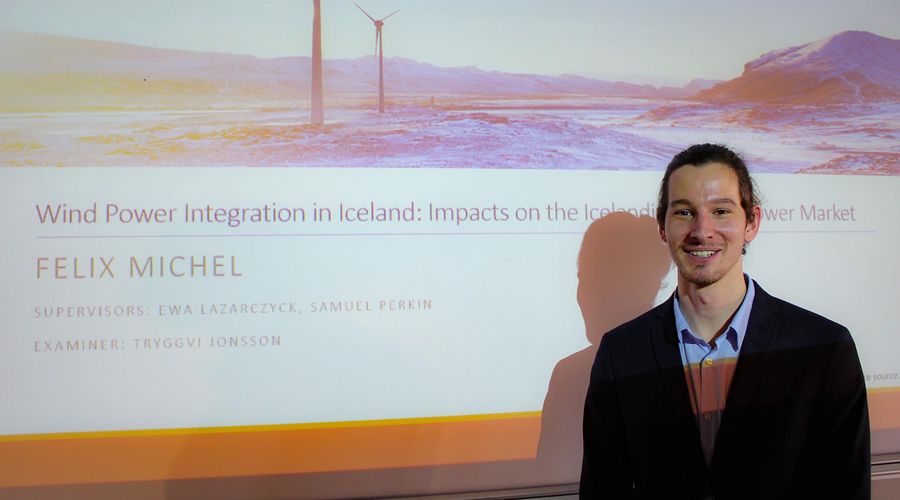MSc Thesis: Wind Power Integration in Iceland - Impacts on the Icelandic Regulation Power Market
Felix Michel successfully defends his master's thesis
REYKJAVIK, January 12 – Master's candidate of Sustainable Energy Sciences, Felix Michel, has just successfully delivered his master's thesis project. Supervised by Ewa Lazarczyk-Carlson and Samuel Perkin, Felix's research was centered on the impacts of the forecast error of wind power on the balance requirements in the Icelandic power grid.
 Currently, electricity production in
Iceland is almost entirely renewable through the utilization of geothermal and
hydropower resources. That being said, recently wind has become a hot topic
given its high potential in Iceland. From the experiences of other countries
such as Germany and Denmark it is known that wind power integration can have
adverse effects on the reliability of the power system, such as increased
balancing requirements for supply and demand, transmission constraints and the
efficiency of operations of power plants using other production technologies.
Such an error has to be resolved in real time by reserves on the regulating
market.
Currently, electricity production in
Iceland is almost entirely renewable through the utilization of geothermal and
hydropower resources. That being said, recently wind has become a hot topic
given its high potential in Iceland. From the experiences of other countries
such as Germany and Denmark it is known that wind power integration can have
adverse effects on the reliability of the power system, such as increased
balancing requirements for supply and demand, transmission constraints and the
efficiency of operations of power plants using other production technologies.
Such an error has to be resolved in real time by reserves on the regulating
market.
In Felix's work, future scenarios of forecast errors after wind integration have been modelled in order to assess whether or not the current legal regulating power reserve of 40 MW should be adapted, considering a suggested wind power project with 203 MW capacity. Two cases were considered: a single wind farm scenario and a geographically dispersed set up in order to highlight the effects of wind volatility. It was found that if a 203 MW power plant was to be integrated, reserves have to be adapted and operation of the power system would become substantially more expensive. However, the amount of excess reserve need and associated costs could see savings if wind power plants are geographically dispersed rather than concentrated in one single area.
Great work and congratulations Felix!
To view Felix's research abstract, click here .
